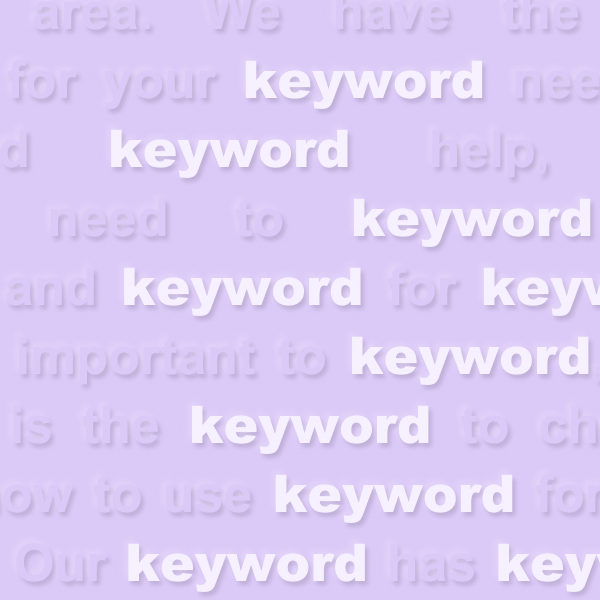Why You Need to Avoid Keyword Stuffing in Your Content

Choosing keywords for your SEO campaign can seem tricky. You want to choose the right keywords that benefit your page and start moving your website up in the rankings. But SEO is an end game. As you wait and watch your website move rank higher on Google, you may want to start seeking different strategies to find a shortcut. However, many of these “shortcut” strategies can hurt your campaign in the long run.
Even if you haven’t heard the term “keyword stuffing” you probably already know what it means or have come across it before. If you’ve ever looked for a recipe online, you will often see content with repeating words and phrases: “Who doesn’t love pumpkin bread? Every year in October my family and I make pumpkin bread together. There are many recipes out there for pumpkin bread but I can assure my family’s pumpkin bread recipe is the best pumpkin bread recipe out there.”
See what I mean?
Keyword stuffing refers to the practice of stuffing a web page, backlinks, and meta tags with as many keywords as possible in an attempt to manipulate ranking on Google’s search engine results page (SERP). Not only is this a hassle for the reader, it’s not the best way to improve your ranking online.
Why It Doesn’t Work
Keyword stuffing is widely condemned by search engines like Google and Bing and can actually harm your SEO. This is considered a “black hat” tactic, which is a practice that goes against search engine guidelines. Keyword stuffing is discouraged as it’s a strategy trying to cheat the algorithm versus a strategy to provide a great user experience.
In 2013, Google released an algorithm update called Hummingbird. Impacting approximately 90% of searches worldwide, Hummingbird took an evolutionary step in perceiving what a user is looking for based on intent rather than keywords alone. Hummingbird wasn’t designed to punish sites; it was intended to sift out low-quality sites and create a better search experience for Google’s users.
Website content should educate and engage your audience. When you stuff your web pages with keywords, you stop writing for your audience and start writing for search engines. This creates a poor experience for your users. If your users have a poor experience they’re not going to stick around. This increases your bounce rates and drives prospective customers from your site.
Google has also placed increased emphasis in the past year on the user-friendliness of a website. By keyword stuffing and adding a lot of unnecessary words and elements to you content, it docks the user friendliness. In turn, it docks your chance of a higher ranking.
It’s not enough to pick a keyword and repeat it over and over in your copy. You need keyword research and a strong strategy to optimize the content on your website and give your pages the quality content to help it rise above your competitors.
How to Use Keywords the Boostability Way
Below you can read how we do keywords, and apply some of those same tactics to your own content.
Keyword Research
When a new customer signs up for an SEO campaign we conduct extensive keyword research on their business and industry. Knowing what our clients do, why they do it, who their clientele is, and how they position their products/services gives us valuable insight into selecting the right keywords. Research is also conducted other business in our clients’ industry to help position them competitively. We research trends so we can craft regional keyword phrases that will drive as much traffic to our client’s website as possible.
Keyword Vetting
When our research is complete, we’ll have a list of strong keywords for your client’s campaign. We take all these factors into consideration and choose keywords that have the best chance of reaching the first page of Google in 6+ months. Many clients believe that casting a wider net and choosing broad keywords will result in more traffic to their website. Although this could be true for certain digital marketing strategies, with SEO the opposite is true. The more specific the keywords, the better chance they’ll have landing on the first page of Google.
Quality Content
Maximizes the impact of your content by correctly identifying your audience and fine-tuning content that appeals to them. Authenticity is one of the best ways to create content that has high SEO value. Infuse your organization’s personality, mission and goals into every piece you write. Don’t just throw a bunch of information together or stuff keywords into the copy. The most effective content does the job for which it was created. Quality content brings in your audience and keeps them there. Choosing specific keywords for your content adds value to your website and improves your overall search ranking results.
Move Up in Rankings with a Good Strategy
You will see your keywords climb in the rankings by building a good keyword research strategy. Include the right information for your user intent and relevant content on your website.
SEO is a long game. It takes patience and diligence in choosing the right keywords. You don’t want to take shortcuts or stuff your site with irrelevant keywords that hurt you in the long run. Choosing specific keywords for your website will bring in the win. Leave stuffing where it belongs— next to your mashed potatoes and gravy on Thanksgiving day.
To find out more about how Boostability can improve your presence online, call us! 800-261-1573.

